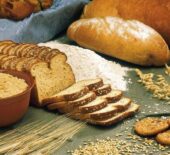Are you confused how to eat to look after the health of the planet and your body at the same time? There are many mixed messages on the internet which may leave you feeling confused. This blog will help to clear any confusion and help you to look after both your health and to assist in promoting a sustainable food system into the future.
It may surprise you to learn that in diet choices which are poor in nutrients and high in energy make up approximately one third of the greenhouse gas emissions produced.1
According to WHO and FAO a sustainable and healthy diet can be defined as a diet which ‘promote all dimensions of people’s health and wellbeing, have low environmental pressure and impact, and are accessible, affordable, safe, equitable and culturally acceptable.’2
There are key factors which are linked to the health of the planet and a sustainable food system as well as an eating pattern which keeps you at your healthiest. These include:
- A system of agriculture which is both sustainable and efficient including the processing of foods to their end products.
- Eat to meet your individual health needs.
- Minimise food wastage.
- Eat a plant-based diet.
The first point is largely link to policy, but the other three points are points you can include in your lifestyle. Following these above suggestions may also save you money, and with the growing cost of living can be a bonus.
One example of a diet which aims to combine the health of the planet and its people is The Planetary Health Diet. This diet was developed by the EAT-Lancet Commission and describes this diet as ‘consists mostly of plant foods, but eggs, fish, dairy and meat may still be eaten to obtain adequate nutrients. Ideally, all food should be sustainably and regeneratively produced within local ecosystems and the limited resources of the earth, while harmonising with various cultural contexts and environmental conditions.’ 3 Plant-based foods include vegetables, fruits, wholegrains like oats, quinoa, wholegrain bread, pasta and couscous, also nuts, seeds, legumes, and beans.
This diet does not restrict animal-based foods but simply reduces the quantity to meet needs and not exceed these needs. Also, including more plant-based foods as lean meat alternatives are recommended. Plant-based protein alternatives can include beans and legumes, tofu, nuts, and seeds. This can improve the health of your gut as well as reduce the greenhouse gas emissions produced by animal-based meats.
Following the Australian Dietary Guidelines on serves of lean meats and dairy recommended each day is a smart lifestyle choice to meet both your individual needs and reduce exceeding these needs. For health and to reduce your risk of certain cancers like colorectal cancer it is recommended to include no more than 350-500g of red meat a week which includes pork. 4
Take home message: By making some simple swaps and moderating meat products to meet your needs but not exceed these needs are lifestyle habits which can help keep the health of the planet and your body optimal.
References:
- Ridoutt B, Baird D, Hendrie GA. Diets within Environmental Limits: The Climate Impact of Current and Recommended Australian Diets. Nutrients. 2021 Mar 29;13(4):1122. https://doi.org/10.3390/nu13041122 22.
- FAO and WHO. Sustainable healthy diets – Guiding principles. 2019. https://www.fao.org/3/ca6640en/ca6640en.pdf
- Willett W, Rockström J, Loken B et al. (2019). Food in the Anthropocene: the EAT–Lancet Commission on healthy diets from sustainable food systems. The Lancet, 393(10170), 447–492. https://www.thelancet.com/journals/lancet/article/PIIS0140-6736(18)31788-4/fulltext 16.
- National Health and Medical Research Council. Australian dietary guidelines. Canberra: NHMRC; 2013 Available from: https://www.nhmrc.gov.au/_files_nhmrc/file/publications/n55_australian
- Table for 10 Billion Putting health & sustainability on the menu. Nestle Professional. https://www.nestleprofessional.com.au/sites/default/files/2024-03/Nutripro_Healthy_Sustainable_Menus_FINAL_1.pdf








